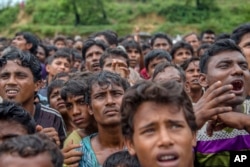Vice President Mike Pence, speaking about the Rohingya crisis in the strongest terms used by any senior official to date, on Wednesday condemned the “historic exodus” of the Rohingya from Myanmar to Bangladesh in the face of violent attacks.
Speaking at a U.N. peacekeeping meeting, Pence said the world was witnessing a "great tragedy unfolding" in the Southeast Asian nation, also known as Burma.
“Recently, Burmese security forces responded to militant attacks on government outposts with terrible savagery, burning villages, driving the Rohingyas from their homes," Pence said at the high-level Security Council meeting. "The images of the violence and its victims have shocked the American people, and decent people all over the world.”
Over the past month, more than 400,000 Rohingya Muslims have fled from Myanmar, where they face human rights violations and discrimination. Pence noted that tens of thousands of those who fled on foot were children.
Rohingya militants attacked Burmese security forces in late August. Since then, analysts and rights workers say, the Burmese military has carried out a brutal crackdown, burning villages and killing women and children as they fled.
Pence noted that U.S. Secretary of State Rex Tillerson had spoken with Myanmar’s civilian leader, Aung San Suu Kyi, about the Rohingya refugees Tuesday and had urged the Burmese military and security forces to facilitate humanitarian aid.
“While we welcome [Aung San] Suu Kyi’s comments that returning refugees have nothing to fear, the United States renews our call on Burma’s security forces to end their violence immediately and support diplomatic efforts for a long-term solution," Pence noted.
US aid to Rohingya
The State Department on Wednesday announced the United States was set to contribute $32 million worth of humanitarian aid to help the Rohingya Muslims fleeing Myanmar.
The U.S. aid package — the first major response from the Trump administration to the situation — will include food, medical supplies, water, emergency shelter and other support.
Simon Henshaw, acting assistant secretary of state for population, refugees and migration, briefed reporters at the U.N. on the humanitarian aid announcement. He clarified that of the $32 million, $28 million would go to Bangladesh.
Henshaw thanked the Bangladeshi government and people for their "warm response and their strong response" in supporting the Rohingya who have come across the border.
"Bangladesh, as we all know, is not one of the richest countries in the world, and for a country which has its own struggles to open its arms to the Rohingya is really remarkable, and I think will be long remembered," he added.
Aung San Suu Kyi has condemned the human rights violations taking place in her country's western Rakhine state, but she has come under strong international criticism for not speaking out more forcefully on the situation. She canceled her appearance at the U.N. General Assembly this week, in part to address the crisis at home.
In a nationally televised speech in her country Tuesday, Aung San Suu Kyi said her country did not fear international scrutiny, and she offered her assurance that any human rights violations or “acts that impair stability and harmony” would be dealt with “in accordance with strict norms of justice.”
The Nobel Peace Prize laureate insisted, however, that all “allegations are based on solid evidence before we take action.”
U.N. Secretary-General Antonio Guterres, during a Tuesday speech before the General Assembly, said he was “shocked by the dramatic escalation of sectarian tensions” in Myanmar, and he called on authorities to “end the military operations” in Rakhine.
The State Department said the $32 million, which brought the total amount of U.S. aid provided to Myanmar refugees in fiscal 2017 to $95 million, would make up about a quarter of what human rights groups say will be needed to address the crisis. The remaining money is expected to be provided by other countries.





